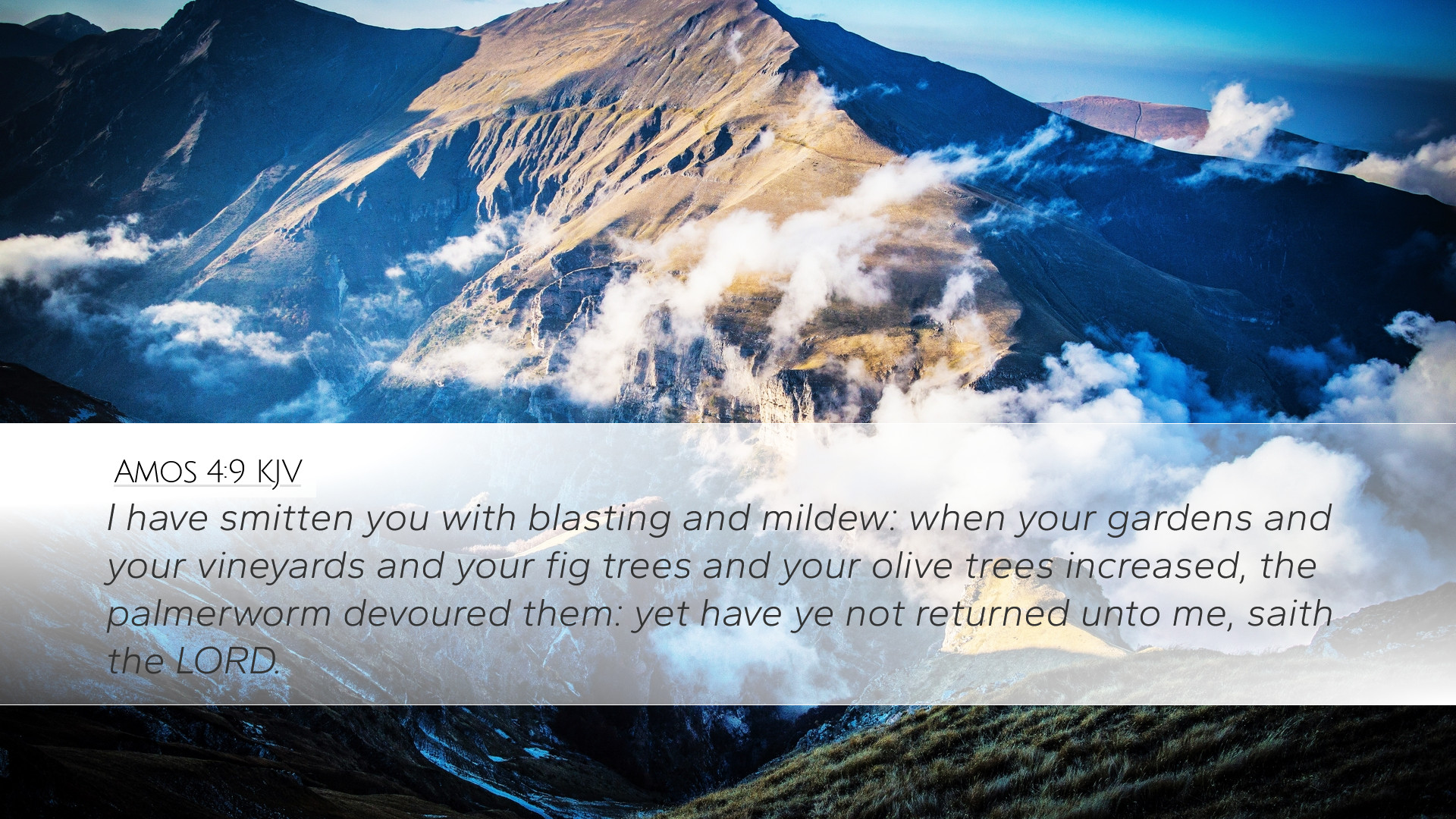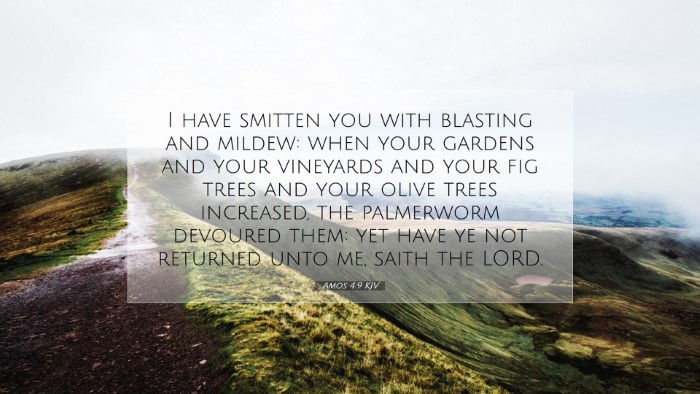Old Testament
Genesis Exodus Leviticus Numbers Deuteronomy Joshua Judges Ruth 1 Samuel 2 Samuel 1 Kings 2 Kings 1 Chronicles 2 Chronicles Ezra Nehemiah Esther Job Psalms Proverbs Ecclesiastes Song of Solomon Isaiah Jeremiah Lamentations Ezekiel Daniel Hosea Joel Amos Obadiah Jonah Micah Nahum Habakkuk Zephaniah Haggai Zechariah MalachiAmos 4:9
Amos 4:9 KJV
I have smitten you with blasting and mildew: when your gardens and your vineyards and your fig trees and your olive trees increased, the palmerworm devoured them: yet have ye not returned unto me, saith the LORD.
Amos 4:9 Bible Commentary
Amos 4:9 Commentary
Verse Text: "I have smitten you with blasting and mildew: when your gardens and your vineyards and your fig trees and your olive trees increased, the palmerworm devoured them: yet have ye not returned unto me, saith the LORD."
1. Contextual Overview
The book of Amos is a striking prophetic work that reveals God's message to Israel during a time of prosperity tainted by injustice and spiritual complacency. This verse illustrates a critical moment in which God reminds the Israelites of the consequences of their actions and their need for repentance.
2. Summary of Insights
- Divine Judgment: Matthew Henry notes that the suffering mentioned is direct evidence of God’s judgment upon the Israelites. The terms “blasting” and “mildew” are specific forms of agricultural distress that signify divine displeasure.
- Elements of Warning: Albert Barnes elaborates that the purpose of such judgments is to turn the hearts of the people back to God. The prosperity of their gardens symbolizes God's blessings, yet their failure to acknowledge Him shows an ingrained spiritual blindness.
- The Call for Repentance: Adam Clarke emphasizes the phrase “yet have ye not returned unto me,” illustrating that despite experiencing hardship, the Israelites remained unrepentant. Clarke highlights that God’s actions were meant to lead them back to Him, pointing to the persistent mercy even amid judgment.
- Symbolism of Agriculture: The agricultural symbols of vineyards and fig trees represent not only physical sustenance but also spiritual nourishment. The condition of the crops can be seen as a metaphor for the spiritual state of the nation (Barnes).
- Promise of Providence: Henry explains that God's provision and the subsequent withholding of blessing underline a crucial message about spiritual dependency. The plagues of the palmerworm and other pests signify a withdrawal of God’s blessing rather than mere natural phenomena.
- Historic Context: Understanding the historic setting of Amos’ ministry adds depth to this verse. Amos served during a time when Israel was at the height of economic prosperity. However, this prosperity was coupled with significant moral and spiritual decay (Clarke).
3. Theological Themes
This verse addresses several key theological themes relevant for modern interpretation.
- The Sovereignty of God: The verse underscores God's sovereignty in nature and history. God's ability to withhold blessings serves as a vivid reminder of His ultimate control over creation.
- The Nature of God's Judgments: Amos 4:9 illustrates how divine judgment can manifest in the daily lives of individuals and nations. Such judgments are not arbitrary but serve a higher purpose: to bring His people to repentance.
- The Necessity of Repentance: The phrase "yet have ye not returned unto me" serves as a poignant reminder of human inclination toward unrepentance, despite clear evidence of wrongdoing and its consequences.
- Grace Amidst Judgment: Even in the midst of potential devastation, God’s call for repentance reveals His grace. He does not desire destruction but seeks restoration—a theme echoed throughout Scripture.
4. Practical Applications
Pastors and theologians can draw several practical applications from this passage:
- Calling for Awareness: There is an essential need for modern believers to recognize the signs of spiritual decay in their communities and individual lives. This verse compels the church to hold a mirror to its practices and beliefs.
- Emphasizing Repentance: The ongoing call for repentance is timeless. Pastoral ministries must integrate themes of humility, turning back to God, and recognizing His sovereignty in their teachings.
- Encouraging Spiritual Growth: Just as the vineyards represent growth, believers today are encouraged to cultivate their spiritual lives, ensuring that they remain reliant on God’s provision rather than their own achievements.
- Understanding Consequences: A clear understanding of the consequences of sin on community cohesion and individual prosperity is necessary. This verse serves as a warning, emphasizing the importance of social justice within a faithful community.
5. Conclusion
Amos 4:9 presents a compelling narrative of God's persistent desire for His people to return to Him. By analyzing the historical, theological, and practical implications of this verse, believers today can reaffirm their commitment to repentance, recognizing that God's judgments serve as invitations to renewal. The warnings against complacency remain pertinent, calling all believers to a deeper relationship with their Creator.


